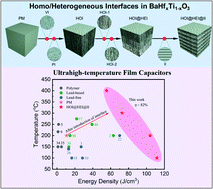Ultrahigh-temperature film capacitors via homo/heterogeneous interfaces†
Abstract
High-performance dielectric capacitors are in high demand for advanced electronics and electric power systems. However, their relatively low operating temperature limits their widespread applications. Here, guided by phase-field simulations, a capacitor is reported to operate at a record high operating temperature of 400 °C with an energy storage density of 55.4 joules per cubic centimeter, energy efficiency of over 82%, and superior thermal stability and fatigue properties. These ultrahigh-temperature performances are achieved through a relatively simple method of introduction and engineering of homogeneous/heterogeneous interfaces within capacitors, which greatly improve their high-temperature stability, relaxation behavior, and breakdown strength. In our work, we not only successfully fabricate capacitors with potential applications in high-temperature electric power systems and electronic technologies but also open up a promising and general route for designing high-performance electrostatic capacitors through homogeneous/heterogeneous interfaces.



 Please wait while we load your content...
Please wait while we load your content...